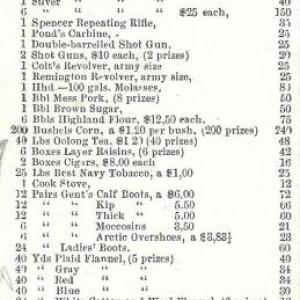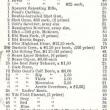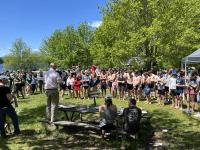This Week in Lincolnville: Stuff Redux
We all have it, from the guy who lives out of his backpack or grocery cart to the neatly organized home complete with file drawers and bookshelves. Stuff. We all have it until or unless catastrophe strikes and a tornado blows it all to the next state.
A few years ago, after Wally died, after months passed and I began to think clearly again, I suggested to my son and his wife that they and their kids move in to this house. I’d live downstairs and they upstairs.
Some many months later they did, into the renovated upstairs, the bedrooms where Ed and his brother grew up transformed into a kitchen, the dusty, spidery barn loft now a living room and office (make that Lego room) with high ceilings, skylights, and windows overlooking Wally’s favorite view – the treeline behind the pasture where our cow once munched.
In the process I cleaned out nearly 50 years of collected stuff. Or so I thought. The daily free piles out by the road, regular truckloads to the dump: I thought I was on top of it. I’d pared down to the essentials and would live in four rooms, all my clothes in one small closet, only the books that fit on a couple of shelves.
Ha. Or so my upstairs D-I-L would say.
The place is packed, from the underbed plastic bins holding things I couldn’t part with – the wedding dress no one else will ever wear, parts of quilts no one will ever use, sweaters I knit that didn’t fit – to the piles of books there isn’t room for on the skimpy shelves to the magazines I’ll read someday with lunch.
Okay. Let’s leave my house and go down to the old Beach schoolhouse. It’s where I gladly escape from my own belongings. Of course, the second floor, home to the Lincolnville Historical Society, is likewise packed with stuff. But at least it’s not mystuff.
How much stuff could a small place like Lincolnville (population 955 the year we moved here – 1970) generate? You have no idea!
Photos: thousands. Diaries: dozens. Letters: boxes full. Tools: drawers full. Household items: a lot. Books: hundreds. Maps: uncounted yet.
Account books: many. Bibles: too many – they’re huge.
And then there’s the random scrap of paper, perhaps a hundred-year- old hand-drawn map of somebody’s property. A receipt for a cow or a teenager’s autograph book, circa 1850. A nearly empty account book that a child practiced writing his name in. A roll of school photos, LCS 1958-59, with no names, just that date.
Which of those should we throw out?
A small crew of volunteers have made it their mission this winter to inventory the whole collection. Over and over again we pick something up (and there are piles of yet-to-be accessioned items) and ask “where does this go?” or often, “why are we keeping this?”
That’s a big part of the inventory. Why do we have it? A historical society is a great place to donate the stuff people don’t want anymore, but still has some sentimental value to their family. Not enough sentiment for anyone in the family to actually want it, but, the reasoning goes, the historical society should.
CALENDAR
MONDAY, Dec. 27
Selectmen meet, 6 p.m., Town Office
TUESDAY, Dec. 28
Library open, 3-6 p.m., 208 Main Street
WEDNESDAY, Dec. 29
Library open, 2-5 p.m., 208 Main Street
Planning Board., 7 p.m., Town Offic
FRIDAY, Dec. 31
Town Office closed
EVERY WEEK
AA meetings, Tuesdays & Fridays at noon, Community Building
Lincolnville Community Library, For information call 706-3896.
Schoolhouse Museum by appointment, 505-5101 or 789-5987
Bayshore Baptist Church, Sunday School for all ages, 9:30 a.m., Worship Service at 11 a.m., Atlantic Highway
United Christian Church, Worship Service 9:30 a.m. indoors, masked or via Zoom
And in fact, often we do. Some of the best gifts we get come in a plastic bag with the contents of someone’s desk drawer. The relative cleaning out the house after its owner died empties those drawers into a bag and lets us figure it out.
We find yellowed obituaries; now it’s easy to find death dates, etc. on the web these days, but not these flowery, detailed descriptions of the deceased that were printed in an old Camden Herald or Republican Journal. There are well-read letters, those random receipts, old political buttons – “I Like Ike”, match books from defunct restaurants.
I often think of Raymond Oxton, the dairy farmer who lived on Atlantic Highway next door to the Bay Leaf Motel. His house and barn are slowly returning to the earth, the last such abandoned farm in Lincolnville. When I first came such places were common in every small Maine town. Curious people, like me, would stop and peek in the open door, maybe even venture inside, sit in a broken-down rocker and peer out the window, wondering who once lived there.
But I’d visited that house when Raymond still lived there, sat in his kitchen and asked him about his life. He’d start telling me a story, then jump up, rummage through a pile of stuff on the shelf and pull out a clipping, circa 1952 maybe, and hand it to me to illustrate the event.
Raymond’s house held a treasure of Lincolnville’s past. I’ve often wondered what became of it all, though a dumpster sat outside for quite a while after the property changed hands. I didn’t have the gumption at the time to ask the new owner if I could have a look at the stuff before it was thrown away.
Maybe it’s just as well we never “inherited” Raymond’s stash; we have more than enough stuff to deal with as it is. The Bibles for one. Now I have nothing against a Bible, but it’s interesting how many really old ones are given to us. They’re large, those family Bibles, some quite elaborately illustrated and bound, easily weighing 4 or 5 pounds each. They take up a lot of room, and I’m pretty sure nobody is ever going to open one up and read it.
The family Bible is where births, marriages and deaths are recorded, usually on special pages between the Old and New Testaments. Since every Bible tells exactly the same stories in exactly the same words, these family records are the only pages of interest to us. Unless there’s an inscription on the inside, we can’t keep most of these monsters. One local genealogist I know used to buy them at yard sales, take them home, cut out those inside pages and burn the rest of the book.
One or two Bibles were donated to the Historical Society along with a handwritten history of its provenance through a Lincolnville family; naturally those we’ve kept. But before we relegate an old Bible to the “deaccessioned” pile we carefully page through it in case somebody tucked away a treasure.
Four-leaf clovers are pretty commonly pressed between the pages, autumn leaves, even a scattering of pansies, perfectly preserved. Maybe a note or a letter. But just when you think these musty old Bibles (or the contents of an old man’s leather wallet) aren’t worth saving you find this Lincolnville Gift Association ticket, pictured above, that someone had slipped inside the family Bible.
Many of us remember the Fireman’s Ball and the raffle tickets everyone bought. You paid 50 cents or a dollar for each ticket, and got a whole list of the prizes, and the winning tickets were drawn at the Ball. This “Gift Association” tickets appears to be the same thing, though way long ago. Look at the prizes: a three-year-old gray colt, a gold watch, a Remington revolver, 24 pairs of ladies’ boots. Twelve acres of land!
The ticket is undated, though the three men apparently responsible for the raffle are listed at the bottom: Wm. P. Coleman, H. W. Marriner, Geo. Donnald.
This random bit of ephemera, left inside a Bible, found in the fall of 2021, appears to be of 19th century origin. And it apparently originated in Lincolnville. Two of those three men are known to us as Lincolnville citizens.
Want to be a researcher for the Lincolnville Historical Society? If you’re good at ferreting out obscure information here’s a puzzle to work on these cold winter days.
What was the L’ville Gift Association? Was this a phenomenon wider than our town? What are the birth and death dates of the three men? What did they do for a living? Who donated those prizes? Who benefited from the ticket sales? Were the gifts ever distributed?
Compare this gift card to one from 1937 which you can see on Facebook
Imagine how the town had changed from the earlier card to 1937!
Contact us at the LHS by email If you find answers to any of the questions.
Going forward there will be more and more items in the LHS’ collection that need more information. If you enjoy this sort of research, giving context to items that are no longer familiar to us will broaden our understanding of our town’s history.
And make the “stuff” we’ve got make sense.
Covid Booster Clinic
Town Administer David Kinney sent this out: “The Town of Lincolnville in conjunction with North East Mobile Health Services will be offering a pop-up vaccination booster clinic Wednesday, December 29 between the hours of 9 a.m. and 1 p.m. at the Center Community Building (18 Searsmont Road) in Lincolnville.
Walk-ins only, no appointments necessary, no cost. PLEASE BRING YOUR VACCINATION CARD! The available booster will be Moderna. The booster is only available to those 18 years of age or older. It is okay to mix and match, so if you had the J&J or Pfizer vaccinations previously you can still receive the Moderna booster. Approximately 200 booster doses will be available. You do not need to be from Lincolnville. The clinic is open all.”
Town
A petition in opposition to a proposed pier, ramp and float that would extend out into the bay near Shag Rock is being presented to the Selectmen at their meeting tonight, Monday Dec. 27. According to John Pincince, one of the petition’s presenters, “the total length is 300 feet of pier, 55 foot ramp and a 16 by 30 foot float. It would sit on large granite piers. It is, in our opinion, completely out of scale for this undeveloped and pristine stretch of Lincolnville coastline.”
Read more about this project in last week’s Pilot article.
HAPPY NEW YEAR!
Here’s to better days ahead. To parades and Strawberry Festivals, Blueberry Wingdings, indoor concerts and storytelling fests. To parties without fear of covid, to greeting each other mask-free, smiling with more than just our eyes…


























